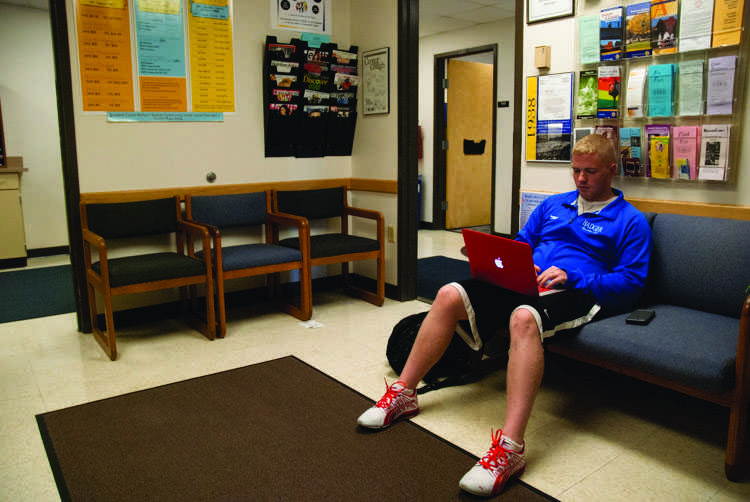Skipping sickness
Wisconsin mom campaigns against meningitis, campus officials lend tips and tricks to staying healthy
Photo by Anna Mateffy
Freshman Ryan Battist came to Student Health Service for a physical and to see if he has asthma – a condition he said he thinks came from living in the dorms.
Earlier this week, Gail Bailey sat in the living room of her Madison-area home and looked at a photo of a smiling young boy.
That young boy was the apple of her eye. He grew to be more than six feet tall, graduated as the valedictorian of Jefferson High School and had a kind heart, his mother recalled.
It has been 12 years since Bailey last saw that smiling face of her son Eddy who died of Type C Meningitis on Nov. 12, 2002.
“Our lives were never the same,” Bailey said. “Every fall at this time of year I get this feeling that we need to tell people to protect themselves.”
Just 16 hours before he died, 20-year-old Eddy arrived back at his Madison apartment where he was in school for economics and finance. This was after a weekend of visiting a friend at UW-La Crosse. He started to feel ill, with chilled hands and cold-like symptoms, but he wrote it off as the flu.
However, it wasn’t just the flu, and the next morning Eddy’s family was notified of his death and their lives were never the same.
Following their son’s death, Bailey and her husband, Phillip, helped pass Act 61 in 2003, which states the availability and effectiveness of vaccines against meningococcal diseases must be provided to each student who resides in a dormitory or residence hall.
While Bailey is proud of the work that has been done, she said she refuses to stop until there are no more meningitis deaths and no more families have to go through the “hell on earth” she endured.
The first step toward healthier college campuses starts with the students, Bailey said.
“The young people have to look out for each other on campus,” she said. “Look out for one another and get the vaccine.”
Although meningitis hasn’t reared its ugly head at UW-Eau Claire in recent years, the bacterial infection has invaded Wisconsin’s Most Beautiful Campus in the past, like most UW System campuses.
In 2002, a 22-year-old Blugold contracted the disease and died following hospitalization.
Staying healthy
While meningitis is rare, other ailments are not. Laura Chellman, director of Student Health Service, said SHS diagnosed roughly 2,900 problems related to eyes, ears, nose and throat last school year and upper-respiratory illnesses have hit the ground running already this school year.
“Germs are a part of life,” Chellman said. “You can’t control that, but you can control are your eating habits, sleeping habits, exercise and just having a well-balanced, healthy life.”
Chellman said illnesses spread rapidly anywhere there are large congregations of people, like in the dorms. She advises students do not share water bottles or utensils, stay three feet away from people who are already ill and wash their hands frequently.
Chellman noted it is important for students to get flu shots, which will be available on campus for $15 for students, which is one sure way to decrease the risk of getting influenza, Chellman said.
TJ Gouker, a senior psychology student, has been a resident assistant in Towers North for three semesters. During his time as an RA, Gouker has seen his fair share of coughs and colds circulate through his wing. The sure signs of sickness have already shown themselves this semester, Gouker said.
“A ton of guys have been getting sick the last week, and it’s spreading all over the place,” Gouker said. “A lot of sinus problems but no flu systems yet.”
As a preventative measure, Gouker strongly encourages his residents to get enough rest, he said.
“Living in a dorm area, people stay up really late as it is so I recommend they rest and get to sleep soon enough and that is usually the first step,” Gouker said. “Also, a lot of Vitamin C.”
Keeping up
Common side effects of illnesses among college students include absences and stress, Joe Abhold, dean of students, said.
Abhold said the first thing students should do if they’re going to be out sick is contact their professor, honestly explain their situation and work toward possible solutions.
While the university absence policy excuses “illness, injury, or emergency of such severity as to prevent the student from being able to attend class,” Abhold said there is something missing from the list of excused absences which concerns him: mental health situations.
While the Dean of Students Office isn’t directly involved in excusing student absences related to illness or otherwise, students often approach Abhold’s office when they are feeling overwhelmed.
“Sometimes people skip class to do something fun, sometimes it’s because they had too much fun the night before but sometimes it’s because they are feeling anxious and overwhelmed,” Abhold said.
Abhold encourages students to go to class even if they are feeling overwhelmed, noting honest communication with professors is important.
“Absences are a big deal at UW-Eau Claire because there is a focus on attendance,” he said. “I think it can be very helpful for students to think about the consequences of their absences. It makes a headache to deal with absences when you’re actually sick.”
Autumn is marked by back to school, crunching leaves and flu and cold season. For Gail Bailey it is also marked with a reminder of intense emotional turmoil.
“The fall is always a really hard time because everything comes to the surface,” Bailey said. “It was just a horrible time. It has been about 12 years and we are coping better than we did at first. When you are in college you get so run down, you have to take care of yourselves.”










